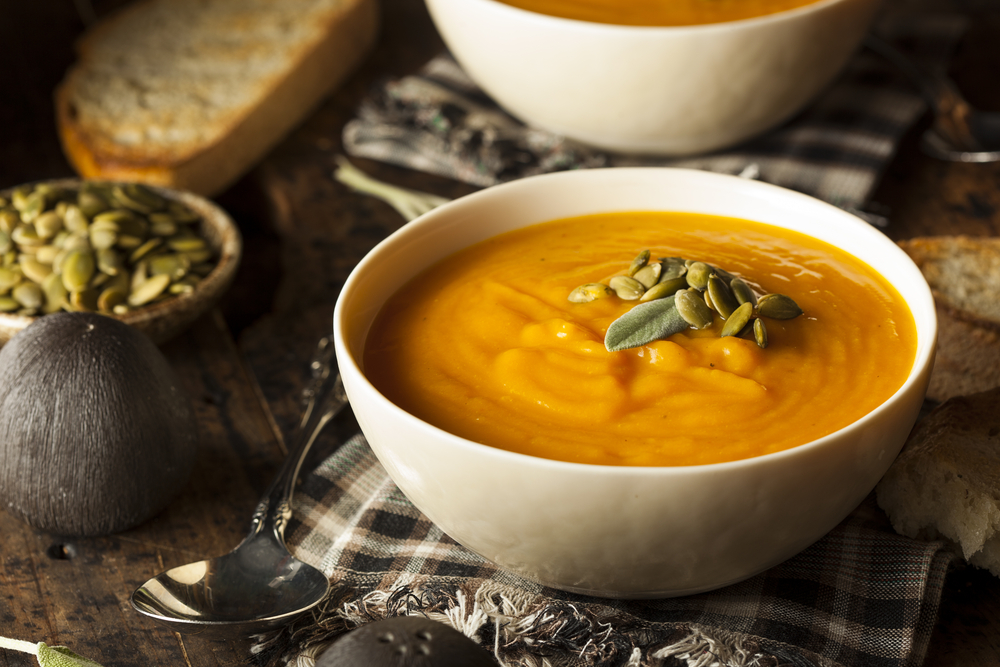
There’s so much being talked about in terms of immunity currently, and for obvious reasons. The immune system needs to be fully supported at this time of year and especially right now. Whilst it’s never ‘one thing’ that cures all, taking a combined approach is always best.
What we put into our body nutritionally is very important. Enjoying an immune-boosting soup is an easy, delicious, and effective way of protecting the body against unwanted invaders.
Clinical Nutritionist Suzie Sawyer shares her three favourite soups to help support your immunity.
The rooted soup
Push back against the same old recipes for chicken broth soup and get the body rooted where it loves to be! All root vegetables are in season right now and this is no coincidence. Nature knows what the body needs and provides it at the right time of year.
Root vegetables including turnips, carrots, potatoes, sweet potatoes, kale, parsnips, and onions all work really well in soups. You can blend them as much as you like, either to create a smooth texture or enjoy as a thicker broth.

Root vegetables are a great source of energising B-vitamins, immune-boosting vitamin C and beta-carotene as well as a range of other antioxidants to help protect the body. You don’t need to over think what you put into the mix with this soup as all the vegetables work superbly together. And if you haven’t got them all in the larder, that’s no problem either; just use what’s to hand. Spice them up with other roots such as garlic and ginger to really super-charge the immune boost.
The detox soup
Whilst the body has its own, very effective methods, of detoxifying, if the remnants of Christmas over-indulgence are still putting extra stress on the body, then the immune system may be under more threat. Helping the body to detoxify is going to be really beneficial right now.

Foods that encourage liver detoxification include broccoli, garlic, turmeric, and onions. These ingredients work really well in a soup – you can also add celery which is a natural diuretic. Additionally, carrots are loaded with beta-carotene which is turned into immune-boosting vitamin A within the body.
You’ve got the perfect range of ingredients; you just need to boil them up with some vegetable stock and add seasoning.
The East meets West soup
Coconut milk is a staple ingredient in many eastern cultures. It’s generally well-tolerated by all digestive systems and contains plenty of compounds that help to naturally cleanse the body. A coconut curry soup is great for supporting detoxification but also contains many warming spices to naturally support immunity during the winter months. Furthermore, the super-healthy brassica vegetables, cauliflower and kale play a starring role in this tasty soup.

You’ll need onions, garlic, vegetable stock, chopped cauliflower and kale, curry powder, ginger, turmeric, and coriander leaves, plus, of course a can of coconut milk. As with most soups, the ingredients just need to be gently simmered until cooked and then the soup is best blended to bring all the delicious flavours together.
A word about spices
Nature has provided an amazing treasure chest of delicious and warming spices which are especially beneficial to the immune system at this time of year. Why not experiment with their flavours? Cinnamon, turmeric, cumin, paprika, ginger, garlic, coriander, various curry powders, and garam masala all have a place in daily cooking.

They all provide disease-fighting, blood-sugar balancing, digestion-soothing and internal cleansing benefits, so fill up your store cupboard with dried versions so they’re always available. Also look to use fresh herbs as much as possible. Your body will certainly thank you for it!
So, enjoy these delicious soups and give your immune system a helping hand at the same time.
Stay well.
FOR MORE GREAT DIET AND LIFESTYLE ADVICE:
Sign up to receive our blog and get a weekly dose of the latest nutrition, health and wellness advice direct to your inbox.
Follow us on Twitter @feelaliveuk for nutrition, lifestyle and well-being tips.
Visit us at www.feelaliveuk.com for the latest offers and exclusive Alive! content.
Follow and Chat with Suzie on Twitter @nutritionsuzie
For everything you need to know about vitamins, minerals and herbs visit our sister site Herbfacts
All images: Shutterstock



 If you’re following ‘Veganuary’ or are already vegan, then you might want to add at least a tablespoon full of ground flaxseeds to your morning cereal as they are a very rich source of omega-3s. However, if you can eat fish, especially the oily kind, then omega-3s from these sources tends to be better absorbed by the body. As an example, wild salmon at least three times a week is recommended for you to notice an improvement in mood.
If you’re following ‘Veganuary’ or are already vegan, then you might want to add at least a tablespoon full of ground flaxseeds to your morning cereal as they are a very rich source of omega-3s. However, if you can eat fish, especially the oily kind, then omega-3s from these sources tends to be better absorbed by the body. As an example, wild salmon at least three times a week is recommended for you to notice an improvement in mood.















